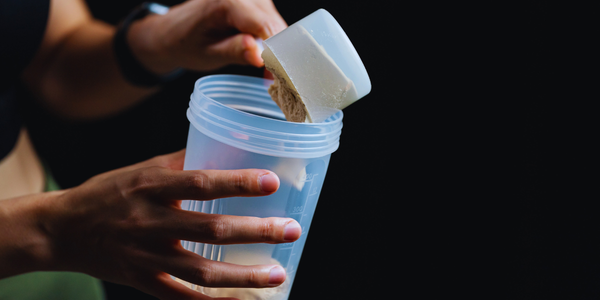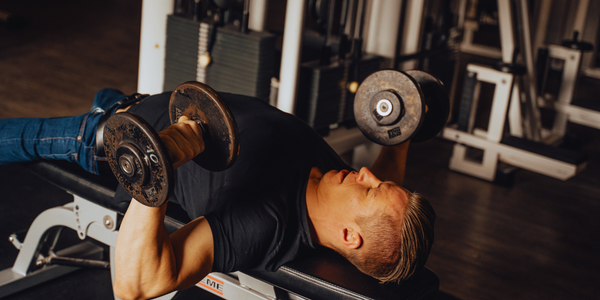Best Peptides for Building Muscle - Top Research Guide
Discover the best peptides for building muscle backed by scientific research. Learn about effective compounds, dosages, and safety considerations for optimal muscle growth.

Did you know the Sermorelin-Ipamorelin-CJC1295 trio is as good as HGH for muscle growth? These peptides are changing how bodybuilders and fitness fans build muscle. In this guide, we'll explore the science of peptides and the best options for building your dream physique.
Peptides are short amino acid chains important for muscle growth and recovery. They are more easily absorbed than regular proteins. This makes them a favorite for those wanting to build muscle and boost athletic performance.
https://www.youtube.com/watch?v=qUW896L3Utw
Key Takeaways
- Peptides stimulate growth hormone release, leading to bigger muscles and a leaner body.
- CJC-1295 boosts growth hormone levels by 200-1000% for up to 6 days.
- IGF-1 LR3 helps keep nitrogen and promote protein synthesis for muscle growth.
- Peptides like Ipamorelin and CJC-1295 also improve sleep, key for muscle recovery.
- Injectable peptides offer better dosages than oral supplements for faster results.
Understanding Peptides and Their Role in Muscle Development
Peptides are short chains of amino acids that act as signaling molecules in our bodies. They play a key role in muscle growth and development. By boosting growth hormones and protein synthesis, peptides help build and keep lean muscle.
What Are Peptides and How Do They Work?
Peptides are made of 2 to 50 amino acids, shorter than proteins. They interact with receptors in our bodies, triggering various responses. Growth hormone-releasing peptides (GHRPs) can increase growth hormone (GH) and insulin-like growth factor-1 (IGF-1) production. These hormones are vital for muscle growth and repair.
The Science Behind Peptide Muscle Growth
Peptides work in several ways to promote muscle development. They boost protein synthesis, helping build new muscle tissue. They also help manage inflammation, leading to quicker recovery. Some peptides enhance energy and endurance, allowing for more intense workouts, which supports muscle growth.
Natural vs. Synthetic Peptides
Peptides can be natural or made in a lab. Natural peptides are vital for our body's functions. Synthetic peptides aim to mimic natural ones, often for stronger effects. Both types can aid in muscle growth, but choosing the right one and dosage is crucial for safety and effectiveness.
By understanding peptides, fitness lovers and athletes can use them to reach their muscle-building goals.
Best Peptides for Building Muscle: Top Research-Backed Options
If you want to build lean muscle and boost your physical performance, some peptides are worth looking into. These muscle building peptides help by releasing human growth hormone (HGH) and boosting insulin-like growth factor 1 (IGF-1). Both are key for muscle growth and recovery.
Here are some top peptides backed by research for muscle building and performance enhancement:
- Sermorelin
- Ipamorelin
- CJC-1295
- Hexarelin
- BPC-157
These peptides can help increase lean muscle, boost strength, cut down body fat, and speed up recovery. But, it's important to know that the FDA has updated rules on some peptides. Some that were once popular are now off-limits.
Getting peptide therapy through injections is almost painless, has no side effects, and works well for rejuvenation and improvement. Always talk to experts before starting any peptide treatment to make sure it's safe and works well for you.
There's also new research on weight-loss peptides like semaglutide and tirzepatide. They might help improve body composition and physical performance. These peptides can cut down on fat while keeping lean body mass.
Growth Hormone Secretagogues: CJC-1295 and Ipamorelin
Building muscle and improving body shape are key goals for many. CJC-1295 and Ipamorelin are two peptides that help achieve these goals. They boost natural growth hormone, essential for muscle hypertrophy and fat reduction.
Benefits of CJC-1295
CJC-1295 is a synthetic peptide with 30 amino acids. It can raise growth hormone levels by 200-1000% for up to 6 days. This makes it great for muscle growth and strength gains. It also helps with recovery, regulates body rhythms, and may slow aging.
Ipamorelin's Muscle Building Properties
Ipamorelin boosts growth hormone release without raising cortisol. It's a good choice for those wanting to boost muscle mass, recover faster, and burn more fat. Its quick action, lasting 2 hours, is a big plus for muscle-building.
Optimal Dosing Protocols
Dosing for these peptides varies. CJC-1295 is usually given at 500-1000 mcg daily. Ipamorelin is given at 200-300 mcg daily. Remember, these peptides are not FDA-approved. Always talk to a healthcare professional before using them to ensure safety and proper dosage.
BPC-157 and TB-500: The Recovery Enhancers
Two peptides, BPC-157 and TB-500, are key for quick injury recovery and tissue repair. They are popular among bodybuilders, athletes, and fitness fans. These compounds are known for their amazing healing abilities.
BPC-157 comes from a stomach protein and helps heal muscles, tendons, and ligaments. It also reduces inflammation, which helps muscles grow. TB-500, or Thymosin Beta-4, works in a similar way, making it a great pair for recovery.
These peptides are great for those who often get hurt, like bodybuilders and athletes. They help recover faster from hard workouts and injuries. This means less time off and more time training.
But, using these peptides needs careful thought and advice from doctors. The rules about peptide therapy are changing. It's important to know the laws before trying them.
The benefits of BPC-157 and TB-500 look promising. But, we need more research on humans. Most studies are on animals. We need big human trials to know how safe and effective they are.
In short, BPC-157 and TB-500 are interesting for their healing powers. But, we should use them carefully and with doctor advice. The rules and science are still growing.
IGF-1 LR3 and MGF: Direct Muscle Growth Stimulators
Peptides are getting more popular in fitness, with IGF-1 LR3 and Mechano Growth Factor (MGF) leading the way. They help build muscle by growing and multiplying muscle cells. This is key for muscle development.
Mechanism of Action
IGF-1 LR3 is a stronger version of natural IGF-1. It helps keep nitrogen in the body and boosts protein making. This leads to muscle growth and new muscle cell creation.
MGF, a part of IGF-1, is made when muscles are stressed, like during workouts. It helps muscles recover and grow even more.
Dosage Guidelines
- Start with low doses and gradually increase to minimize risks
- Monitor the body's response closely and consider regular blood work to check hormone levels
- Consult with a healthcare professional before starting any peptide regimen
Expected Results
Using IGF-1 LR3 and MGF can increase muscle, boost endurance, and help lose fat. They help muscles grow and repair naturally. This can help athletes and bodybuilders reach their goals faster.
But, it's important to follow the right dosage and talk to a doctor. This ensures safety and gets the most benefits.
To learn more about peptides for muscle growth and fat loss, check out this comprehensive guide.
Safety Considerations and Legal Status
Peptides are known for their muscle-building benefits. But, it's important to know about the changing rules. The FDA has updated its rules, stopping the use of some peptides like Ipamorelin and CJC-1295. This is because of safety concerns.
But, the FDA has okayed some peptides for building muscle. This includes collagen peptides.
Peptide therapy might cause water retention, hunger, and tiredness. Always talk to a doctor before starting. They can help with the right dose and find safe, legal sources.
Sermorelin is a peptide that's okay with the FDA. It helps the pituitary gland make growth hormone. It's a good choice for those wanting to grow muscle with peptides.
Peptide laws and ethics differ by country. In the U.S., some peptides need a doctor's prescription. If you're thinking about using peptides, check the laws first. Talk to a doctor before starting any peptide program.
FAQ
What are peptides and how do they contribute to muscle growth?
Peptides are short chains of amino acids important for muscle growth. They are easier for the body to use than regular proteins. They help by boosting growth hormone, aiding in muscle recovery, and increasing protein synthesis.
What are some of the top peptides for building muscle?
Top peptides for muscle growth include Sermorelin, Ipamorelin, CJC-1295, Hexarelin, BPC-157, IGF-1 LR3, and MGF. They boost growth hormone, increase IGF-1, and enhance protein synthesis. This leads to more muscle, strength, less fat, and better recovery.
How do growth hormone secretagogues like CJC-1295 and Ipamorelin work for muscle building?
CJC-1295 and Ipamorelin boost growth hormone levels, helping build muscle and strength. CJC-1295 can raise growth hormone by 200-1000% for up to 6 days. Ipamorelin increases growth hormone without raising cortisol, making it safe.
What are the benefits of peptides like BPC-157 and TB-500 for recovery and healing?
BPC-157 and TB-500 are known for their healing powers. BPC-157 helps heal muscles, tendons, and ligaments and has anti-inflammatory effects. TB-500, paired with BPC-157, is great for athletes at risk of injury.
How do IGF-1 LR3 and MGF contribute to muscle growth?
IGF-1 LR3 promotes muscle development by increasing nitrogen retention and protein synthesis. MGF, a variant of IGF-1, is made in response to stress and helps with muscle recovery.
What are the safety considerations and legal status of peptides for muscle growth?
The FDA has updated rules on peptides for muscle growth, banning many. It's important to know which peptides are legal. Peptides can cause water retention, increased appetite, and fatigue. Sermorelin is a safe, FDA-compliant option. Always consult a doctor and buy from trusted sources.
ActiveMan — Make Your Move
The Modern Guide to Men’s Health, Fitness & Lifestyle.





